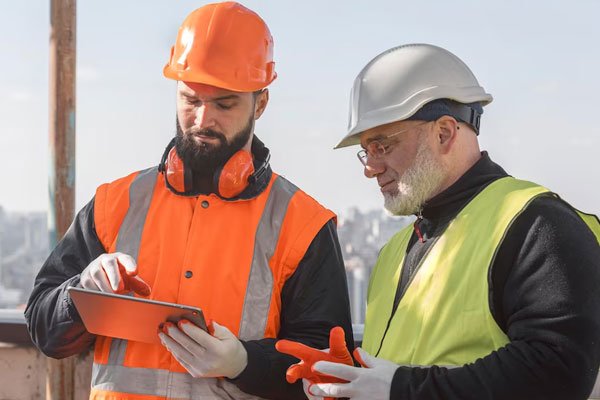Inspection and verification processes are crucial in the construction of any project. They are the key to ensuring the quality and safety of a construction site and, ultimately, to meeting customer expectations. However, establishing effective inspection and verification processes can be a challenge for construction professionals. The complexity of projects, the diversity of systems and materials used, and the number of parties involved are just some of the variables that can hinder the process.
Implementing digital tools for quality management in construction projects brings numerous improvements in different aspects. By establishing custom inspection and verification processes, construction professionals can capture and analyze relevant data to identify potential issues before they become major problems. In this way, it is possible to detect variations in the construction work and correct any deviations in a timely manner, avoiding costly delays and improving the overall efficiency of the project.
Another significant improvement is the optimization of workflows and the optimization of administrative management of building works. By customizing inspection and verification workflows, professionals can avoid redundant or irrelevant tasks, focusing on critical activities to ensure project quality. This not only saves time and resources but also improves the satisfaction of the teams involved by eliminating unnecessary administrative bureaucracy.
In this article, we will explore six ways in which customization of workflows and processes can improve the effectiveness of inspection and verification in construction projects. By implementing these strategies, professionals can optimize their processes, increase efficiency, and enhance the quality of their projects.
Customization of Information to be Verified in Construction
Within the functionalities of ERPs, the configuration of custom fields can improve the efficiency and accuracy of inspection and verification processes in a construction project. Making adjustments to the data to be captured during inspections and verifications ensures that detailed and relevant information for the project is obtained. Specific details about the quality of work being done on-site, such as the amount of construction material used or the quality of the welding, are very important for construction professionals who carry out this type of surveys.
Which data input fields are important for customizing construction site verification processes? Some examples include information about the equipment used, project progress, quality of materials used, inspections and verifications conducted, and any identified issues. In addition to this, it is possible to define specific data fields for each of these aspects, such as dates, drop-down lists, text fields, and more.
By appropriately configuring the data to be verified, coordination between the various collaborating teams in the construction project is optimized. For example, contractors can define custom data fields that allow inspectors to verify if certain requirements have been met before they can be marked as completed. This can help ensure that all project participants are on the same page and working towards the same goals.
Custom Notifications Alerts on Milestones and Tasks in Construction
Custom notifications and alerts are valuable tools for keeping construction professionals informed and updated on inspection and verification processes. This software feature allows for real-time notifications to be configured to receive alerts about specific events and activities in the project. For example, quality control managers can receive notifications when an important inspection has been completed, enabling them to stay informed of progress and take quick action in case of problems or delays.
Furthermore, customized notifications and alerts can help improve communication and collaboration among different teams and stakeholders involved in a construction project. For example, inspectors can receive alerts when the status of an inspection is updated, allowing them to respond to it in a timely manner and coordinate any necessary actions with other team members. This way, everyone is up to date can respond quickly to critical situations or changes in the project.
Also, custom notifications and alerts increase efficiency and agility in quality management for construction projects. By receiving relevant information in real-time, professionals can make informed decisions, avoid unnecessary delays, and ensure that inspection and verification processes are carried out effectively.
Customized Inspection Report Templates
Customized report templates are an invaluable tool in quality management on construction projects. These templates allow professionals to configure and personalize the layout and structure of the reports used to document the results of inspections and verifications. This ensures that the documentation is consistent and clear, and addresses the specific aspects of each project.
The ability to adapt report templates to the needs of each project and the requirements of the involved stakeholders enables construction professionals to provide detailed and accurate documentation. For example, specific sections can be included to summarize key findings, identified issues, recommendations, and actions that were taken. Web app features for uploading images, graphs, or any other visual elements for supporting these reports make them easier to understand and are really valuable.
Furthermore, custom templates can be adapted to the specific requirements of each project, including compliance regulations and quality standards. This helps ensure comprehensive and high-quality documentation, streamlining communication with stakeholders and contributing to the project’s transparency and reliability.
Overall, the ability to configure this type of report translates into time and workload savings for professionals dedicated to construction verification and control.
Customization of quality management solutions allows for a higher level of transparency and collaboration in the project. The customization of quality management solutions enables a higher level of transparency and collaboration in the project. By establishing clear workflows, customizing information fields, and using personalized notifications, you are promoting smoother communication and better coordination among different teams and stakeholders.
Do you want to learn more about possibilities for improving the management of the entire construction and building cycle? Learn more about BrickControl’s features for construction work progress,contractor management and more, to get the best results in your projects.

